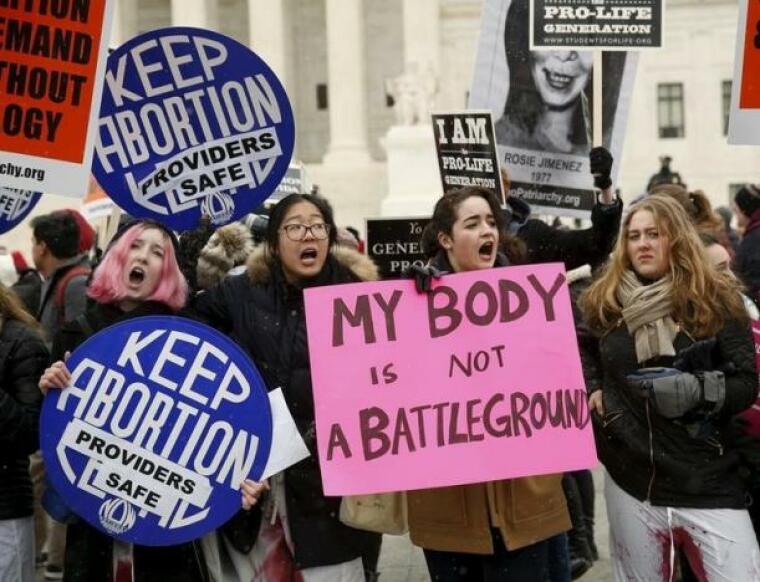Judge nixes Florida's 24-hour abortion waiting period

A judge has permanently blocked a Florida law that required women to wait at least 24 hours before obtaining an abortion.
Tallahassee Circuit Judge Terry Lewis ruled on Tuesday that the law violates women's privacy rights under the Florida constitution.
"Florida law subjects no other medical procedure, including those that pose greater health risks than abortion, to a mandatory delay," Lewis wrote in his decision, according to Reuters.
Lewis noted that the state constitution includes a directive from citizens to the government to stay out of private matters unless there is a good reason.
"And it's hard to imagine a more private, personal matter ... as the decision whether or not to terminate a pregnancy," he said.
The law, signed by Gov. Rick Scott in 2015, requires women to wait 24 hours after consulting an abortionist, who would have to inform the patient about the possible risks of having an abortion.
The American Civil Liberties Union (ACLU), ACLU of Florida, Center for Reproductive Rights and Tallahassee attorney Richard Johnson filed the lawsuit challenging the law on behalf of a Gainesville abortion clinic and Medical Students for Choice.
Opponents of the law argued that the waiting period would make it harder for women to obtain abortions, including those who have to travel long distances to make two trips to clinics.
In his 10-page ruling, Lewis said that the state of Florida had failed to demonstrate that there is a "compelling state interest" for the 24-hour waiting period and did not show that the law was enacted in the "least restrictive manner."
Although the law allowed exceptions for medical emergencies and cases of rape and domestic violence, it still required a 24 hour waiting period even if doctors said waiting might be "adverse" to their health, the judge noted.
"A law that forces a patient to delay medical care to the detriment of her health cannot be the least restrictive means of furthering any compelling state interest," he wrote.
The judge also rejected the state's arguments that most other medical procedures are delayed, even though such delays are not legally required.
During the arguments in November, Blaine Winship, a lawyer representing the state, pointed out that most other medical procedures are not performed on the same day as the consultation between a doctor and a patient. The judge, however, ruled that it does not justify the mandatory waiting period for abortions as no other medical procedures are subjected to mandatory delay.
The ACLU of Florida hailed Lewis' decision, saying it affirms that politicians should not interfere with women's health-care decisions.
"Today's ruling is a win for Florida women. The forced delay law was an insult to women and imposed medically unnecessary and harmful burdens, particularly on low-income patients. This law's intention was to stop women from getting abortion care, plain and simple," said Nancy Abudu, legal director of the ACLU of Florida.
 Christians don't have to affirm transgenderism, but they can’t express that view at work: tribunal
Christians don't have to affirm transgenderism, but they can’t express that view at work: tribunal Archaeology discovery: Medieval Christian prayer beads found on Holy Island
Archaeology discovery: Medieval Christian prayer beads found on Holy Island Presbyterian Church in America votes to leave National Association of Evangelicals
Presbyterian Church in America votes to leave National Association of Evangelicals Over 50 killed in 'vile and satanic' attack at Nigerian church on Pentecost Sunday
Over 50 killed in 'vile and satanic' attack at Nigerian church on Pentecost Sunday Ukrainian Orthodox Church severs ties with Moscow over Patriarch Kirill's support for Putin's war
Ukrainian Orthodox Church severs ties with Moscow over Patriarch Kirill's support for Putin's war Islamic State kills 20 Nigerian Christians as revenge for US airstrike
Islamic State kills 20 Nigerian Christians as revenge for US airstrike Man who served 33 years in prison for murder leads inmates to Christ
Man who served 33 years in prison for murder leads inmates to Christ


 Nigerian student beaten to death, body burned over ‘blasphemous’ WhatsApp message
Nigerian student beaten to death, body burned over ‘blasphemous’ WhatsApp message 'A new low': World reacts after Hong Kong arrests 90-year-old Cardinal Joseph Zen
'A new low': World reacts after Hong Kong arrests 90-year-old Cardinal Joseph Zen Iran sentences Christian man to 10 years in prison for hosting house church worship gathering
Iran sentences Christian man to 10 years in prison for hosting house church worship gathering French Guyana: Pastor shot dead, church set on fire after meeting delegation of Evangelicals
French Guyana: Pastor shot dead, church set on fire after meeting delegation of Evangelicals ‘Talking Jesus’ report finds only 6% of UK adults identify as practicing Christians
‘Talking Jesus’ report finds only 6% of UK adults identify as practicing Christians Mission Eurasia ministry center blown up in Ukraine, hundreds of Bibles destroyed: 'God will provide'
Mission Eurasia ministry center blown up in Ukraine, hundreds of Bibles destroyed: 'God will provide' Church holds service for first time after ISIS desecrated it 8 years ago
Church holds service for first time after ISIS desecrated it 8 years ago Burger King apologizes for 'offensive campaign' using Jesus' words at the Last Supper
Burger King apologizes for 'offensive campaign' using Jesus' words at the Last Supper Uganda: Muslims abduct teacher, burn him inside mosque for praying in Christ’s name
Uganda: Muslims abduct teacher, burn him inside mosque for praying in Christ’s name